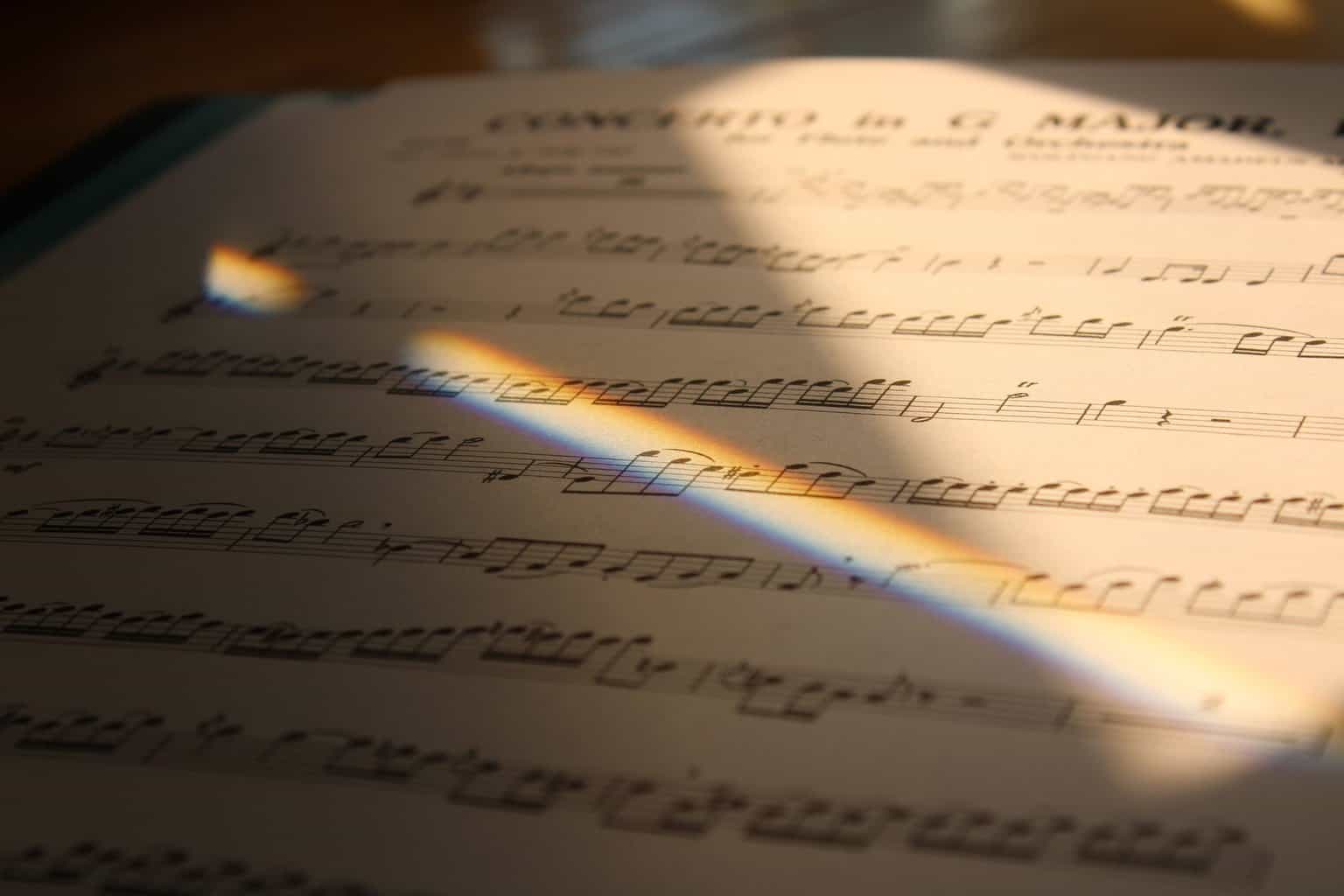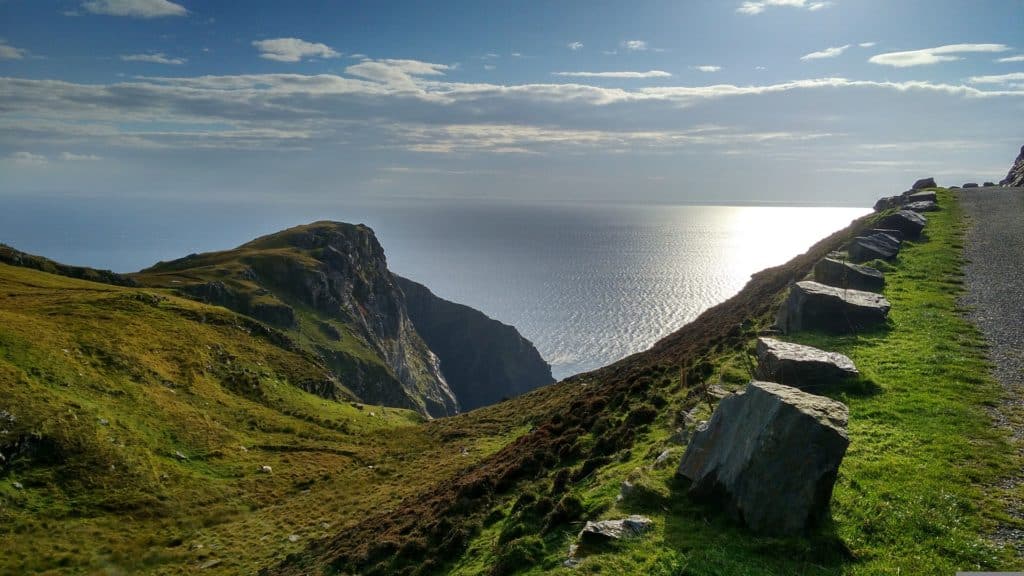Amazing Grace Song: The History and Lyrics

Updated On: April 08, 2024 by Ciaran Connolly
Amazing Grace has become one of the world’s most hauntingly beautiful Christian hymns. Many famous faces have covered the iconic song, from Elvis Presley to Aretha Franklin and Johnny Cash. Even former U.S. President Barack Obama has lent his voice to the song in a powerful rendition.
It’s estimated that the hymn has been performed over 10 million times and has impressively appeared on over 11,000 albums worldwide. The origin and history of the Amazing Grace song are remarkably fascinating and one that we will explore further in this article.
Please keep reading to learn all about this famous song, its origins, who wrote it, its true meaning and much more! If you wish to play or sing along, you will find Amazing Grace lyrics and Chords below!
Table of Contents
Amazing Grace Song History
The Amazing Grace hymn has an incredible history that begins in Donegal, Ireland. Almost everyone has heard this powerful and uplifting song, but few people know much about its origins.
The Story Behind Amazing Grace
John Newton wrote Amazing Grace after landing safely in Donegal, Ireland, after being caught in a ferocious storm at sea. Newton’s arrival in the beautiful Lough Swilly along Ireland’s Wild Atlantic Way influenced his life and marked the start of his return to Christianity.
Up until the point of coming to Ireland, John Newton was involved in the Slave Trade. At a young age, Newton went to sea and worked on slave ships. In 1745, at the age of 20, Newton was captured and became a slave himself.
When he was subsequently rescued, he returned to sea and the slave trade once more, becoming the captain of several slave ships. It is difficult to believe that a beautiful song was written by a person who was part of such atrocious acts, but something happened that would change Newton’s life forever.
In 1748, Newton travelled from Africa to Liverpool and got caught up in an awful storm. The weather conditions were so severe that Newton was said to have called out to God, asking for mercy. Newton considered himself to be an atheist at this point, so this was a last-ditch effort in an attempt to survive somehow.
The ship safely reached Ireland, which marked the beginning of Newton’s spiritual conversion. Although he didn’t instantly change his ways and was still involved in the slave trade for six more years, it is believed that he began reading the Bible in Ireland and ‘started to view his captives with a more sympathetic view.’
Newton went on to become an Anglican Priest, a vocation that would enable him to write many hymns.
Even though the Amazing Grace Song wasn’t written until 25 years later, in 1779, Newton stated that his time in Donegal was a critical moment that inspired the song. The song might not even exist today without the violent storm that led him to Irish shores.
It wasn’t until 1788, 34 years after he retired from the slave trade, that Newton broke his silence on the subject and advocated against slavery. He lived to see the British passage of the Slave Trade Act in 1807 after many years of supporting campaigns.
Has your opinion of the song changed now that you have learned about the life of John Newton?

Who Wrote Amazing Grace?
As briefly mentioned above, Amazing Grace was written by John Newton, an English poet and Anglican Clergyman. In the early part of his life, Newton once considered himself an atheist and was involved in the slave trade. It’s pretty surprising to many people that he then wrote one of the world’s most recognisable songs about God and faith; it was by surviving a storm that Newton began to change his ways and repent for his actions.
Let’s find out more about the writer behind the hymn:
John Newton’s Life
Newton was born in London, England, in 1726, the son of John Newton Sr. and Elizabeth Newton. His father was a shipmaster in the Mediterranean service, and his mother was an instrument maker.
Elizabeth died from tuberculosis not long before John’s seventh birthday. Newtown was then sent to boarding school for a few years before he went to live in Essex at the home of his father’s new wife.
At the young age of 11, Newton went to work at sea along with his father. He sailed six voyages before his father eventually retired in 1742.
His father had planned for him to work at a sugarcane plantation in Jamaica, but John had other ideas. Newton signed himself up for a merchant ship that would sail to the Mediterranean Sea.
Newton’s Time in the British Navy Services
While Newton was on his way to visit friends in 1743, he was captured and forced into the British Navy services. He became a midshipman, an officer of the junior-most rank aboard HMS Harwich. After a failed attempt to escape, he was punished, receiving eight dozen lashes and reduced to the rank of an ordinary seaman.
He was later transferred to another Ship, the Pegasus, a slave ship headed to West Africa. He didn’t get along with his new crew, and they ended up leaving him in West Africa in 1745 with Amos Clowe. Clowe was a known slave trader and gave Newton to his wife, Princess Peye. She was of African royalty and treated him terribly.
Newton’s involvement in Slave Trade and religious awakening
In 1748, John Newton was rescued by a sea captain sent by his father to find him, and they returned to England. It was on this trip back home after defeating a violent storm that he began his spiritual conversion. But he still continued to work in the slave trade. He made further voyages, including a trip in 1750 as the master of the slave ship ‘Duke of Argyle’ and two more on the ‘African’.
Newton even called himself a heartless businessman who didn’t feel empathy for the enslaved people he traded. Finally, in 1754, after Newton became very unwell, he gave up life at sea and stopped working in the slave trading industry.
A couple of years later, he applied to become an Anglican priest in the Church of England, but it was over seven years before he was accepted. Newton was officially announced as a priest on 17 June 1764. As a priest, he became very respected by Anglicans and non-conformists.

John Newton and William Cowper
Newton collaborated with William Cowper, creating vast volumes of hymns, including ‘Amazing Grace.’ William Cowper was referred to as one of the greatest hymn writers in the church’s history. They became friends after Cowper had moved to Onley and began worshipping in Newton’s Church.
Newton would begin writing the song in 1772.
Their first volume of Hymns, the Olney Hymns, was published in 1779. The hymns were written for Newton to use in his Parish, which was usually filled with poor people and uneducated followers. The volume included some of Newton’s most loved hymns, including “Glorious Things of Thee Are Spoken” and “Faith’s Review and Expectations,” the latter of which many people now know as The Amazing Grace Song. The first line of the song would eventually become the title.
By 1836, the ‘Olney Hymns’ had become very popular and had 37 different recording editions. Newton’s preaching also became admired, and his small church soon overflowed with people who wanted to listen to him.
John Newton would come to regret his involvement in the slave trading industry. In 1787, Newton wrote a tract supporting the abolition of slavery, which became very influential. It highlighted the awful horrors of slavery and his involvement within it, which he claimed he sincerely regretted.
Later, he joined forces with William Wilberforce (M.P.) in his campaign to end trade slavery. When the abolishment of the Slave Trade Law finally came into place in 1807, Newton, on his deathbed, was believed to have “rejoiced to hear the wonderful news.”
The World’s Most Famous Hymn – Amazing Grace Song Chords

Below, we have included the lyrics for Amazing Grace. Now that you know John Newton’s backstory, does the meaning of the lyric change for you? The parallel between the song and the writer’s time in Donegal is obvious.
Amazing Grace Song Lyrics
The beautiful words of the hymn are below:
Amazing grace! How sweet the sound
That saved a wretch like me!
I once was lost, but now am found;
Was blind, but now I see.’Twas grace that taught my heart to fear,
And grace my fears relieved;
How precious did that grace appear
The hour I first believed.Through many dangers, toils, and snares,
I have already come;
’Tis grace hath brought me safe thus far,
And grace will lead me home.The Lord has promised good to me,
His Word my hope secures;
He will my Shield and Portion be,
As long as life endures.Yea, when this flesh and heart shall fail,
And mortal life shall cease,
I shall possess, within the veil,
A life of joy and peace.The earth shall soon dissolve like snow,
The sun forbear to shine;
But God, who called me here below,
Will be forever mine.When we’ve been there ten thousand years,
Bright shining as the sun,
We’ve no less days to sing God’s praise
Than when we’d first begun.
Amazing Grace My Chains Are Gone Lyrics
“Amazing Grace (My Chains Are Gone)” is a popular contemporary version of the traditional hymn “Amazing Grace.” It was written by Chris Tomlin, Louie Giglio, and John Newton. Check out the lyrics below:
Amazing GGrace, how sweet the sound
That saved a wretch like me
I once was lost, but now I’m found
Was blind, but now I see
My chains are gone
I’ve been set free My God
my Savior has ransomed me
And like a flood, His mercy reigns
Unending love, amazing GGrace
The Lord has promised good to me
His word my hope secures
He will my shield and portion be
As long as life endures
My chains are gone
I’ve been set free My God
my Savior has ransomed me
And like a flood, His mercy reigns
Unending love, amazing GGrace
The earth shall soon dissolve like snow
The sun forbear to shine
But God, who called me here below
Will be forever mine
Will be forever mine
You are forever mine
This version of “Amazing Grace” adds the chorus “My chains are gone, I’ve been set free” as an expression of gratitude for the freedom in God’s Grace. It has become a beloved and widely sung rendition of the classic hymn.
Amazing Grace Song Meaning
The hymn has gone on to become one of the most powerful songs in the world and a favourite for many. It offers a universal message of hope and redemption—everyone who listens to it can interpret a different meaning for themselves.
John Newton is said to have written the hymn as a heartfelt expression to God. It was a pivotal time in his life when God saved him from the storm and, through the Bible, helped him leave behind the wicked business of slave trading. The song also became a well-known anthem of the Civil Rights movement.
It wasn’t until later on in life, when Newton was a priest, that he debuted the hymn. It was initially known as “Faith Reviews and Expectations” before changing to the song’s opening line.
The hymn opens with the powerful lyrics, “Amazing Grace, how sweet the sound that saved a wretch like me.” Newton drew on his own life working in the slave trade and his near-death experience on a boat, where he believed God saved him and prompted him onto a Christian path. “I once was lost, but now am found; I was blind, but now I see.”
Some people argue that part of the massive appeal of the hymn is the incredible backstory that brought it to life. Newton went from being a cruel slave trader to a highly respected minister. However, many people don’t know the song’s backstory before hearing it. The song’s message is vague enough to be applied to anyone’s life.
The song represents the personal journey many people can relate to: wanting to find meaning in our lives through faith. It offers hope to those who wish to become better and positively change their lives, yet it does not appear judgmental. It is a song that has transcended any one meaning, but its universal message stays the same.
The Popularity of the Amazing Grace Song
Fantastic Grace wasn’t an instant hit. Newton had written around 300 hymns, many of which became British standard songs. But the Amazing Grace song was rarely sung and wasn’t included in most of Newton’s compilation of hymns.
It wasn’t until the hymn crossed the Atlantic Ocean to America that it became hugely popular. It was a favourite among Americans during the 19th century and was cherished by the religious movement known as the ‘Second Great Awakening.’
Preachers of the movement used the song as a way for people to repent of their sins, as the message wasn’t filled with complex understandings. People like starting fresh with their faith, owning their mistakes, and learning to be better, devoting themselves to something that doesn’t judge them but wants them to be better.
The song continued to grow in popularity, especially in Protestant churches. In previous centuries, music had not been a primary focus during services. Many believed that music was a significant distraction for people in the church. However, as we approached the 19th century, many Christian leaders believed music would help enhance the mass experience.
It is worth noting in history that literacy was not always widespread, especially among poorer people. Songs and artwork could spread the message of faith to everyone – including those who could not read – in ways that pamphlets and even the Bible could not. Music had the potential to break down barriers between those who could afford to read and those who could not, creating a sense of unity.
Therefore, the real problem hymns faced was that most people could not sing or read music at that time. So, American Hymn composers created their own form of musical notation. This came to be known as ‘shape-note singing’, an easier way to learn and allowed people to sing in churches.
Fantastic GGrace was sung for many decades at revivals and evangelical churches. The lyrics remained constant, but depending on the church’s location, the song was often conducted with different music. This brings us to our next section, which explores the tune behind the song.
The Standard Version of Amazing Grace
Surprisingly, no music was written for the song. Newton’s lyrics were attached to several different traditional tunes. Eventually, in 1835, composer William Walker added the lyrics of Amazing Grace to a recognisable tune called “New Britain”; the rest is history. Ever since then, this has become the standard version of the Amazing Grace hymnary that is recognised all around the world.
Amazing Grace has a fascinating and complex history. The song became a symbol of hope through social and political turmoil, becoming one of the greatest hymns ever. John Newton’s personal experience of redemption added more meaning to the hymn, but it became much more significant than him. It is a song people sing at defining moments in their lives, including funerals. It was also sung by human rights activists.
To think it all began in a violent storm that led a man to the shores of Ireland, inspiring him to take a new path in life. The story behind the song is pretty remarkable.
Famous Performances of Amazing Grace
Amazing GGrace has taken the world by storm, and many famous musicians have offered unique versions for people to enjoy. It’s without a doubt one of the most recorded songs in the world. Even centuries later, bands and artists are still covering the beautiful song by John Newton. The hymn has also become famous for being played at funerals.
Now that you know the lyrics to one of the most iconic hymns of all time, you may believe that every version is just a generic cover. However, this song means a lot to the many people who sing it. From soulful renditions to vulnerable performances, the song has the power to bring communities together and to remember loved ones we have lost.
Here are some of the most famous Amazing Grace Covers:
Judy Collins Amazing Grace Cover
Judy Collins, an American singer-songwriter, first sang a stunning rendition of Amazing Grace at Bill Clinton’s inauguration in 1993. Throughout her music career, she has covered it many times. Between 1970 and 1972, Judy Collins’ recording of the song spent 67 weeks on the chart and even reached number five.
Here is one of her best versions of Amazing Grace with the Boys Choir of Harlem in 1993 at a Memorial Day concert.
Elvis Presley’s Amazing Grace Cover
Elvis Presley needs no introduction as the undisputed ‘King of Rock and Roll’. He is one of the best rock stars to ever grace the world, and his music has been loved by generations. Elvis offered his own unique performance of ‘Amazing Grace’, intertwined with a country style.
Check out Elvis Presley singing a striking cover of the Amazing Grace Song below.
Celtic Women Amazing Grace Cover
The Celtic Women are a famous all-girl musical ensemble from Ireland; they have beautifully covered many iconic songs such as Danny Boy and ‘Amazing Grace’.
Check out their spectacular version of the song below, leaving you speechless.
Amazing Grace Bagpipes Cover
One of the most loved versions of Amazing Grace is performed by the Royal Scots Dragoon Guards. A few years after Judy Collins had recorded the song, The Royal Scot Dragoon Guards recorded an instrumental version featuring a bagpipe soloist. Their version rose to number 11 in the U.S. charts
Check out their version of the song below:
Aretha Franklin’s Amazing Grace Cover
Aretha Franklin was another famous singer who lent her soulful voice to the song, which has become a fan favourite. Quite honestly, it is a skin-tingling rendition, which isn’t hard to imagine with the power of Aretha’s voice.
Check out her live performance below:
Amazing Grace Jennifer Hudson
Jennifer Hudson performed a powerful rendition of the song at Aretha Franklin’s funeral. Her performance was highly praised and is considered one of the service’s highlights. Aretha Franklin also chose Jennifer Hudson to portray her in the biopic “Respect”. The film includes a scene where Hudson, as Franklin, performs the iconic hymn.
Johnny Cash’s Amazing Grace Cover
Another popular version of the song is by Johnny Cash, who recorded it on his album ‘Sings Precious Memories’ in 1975. Johnny Cash dedicated the song to his brother, who passed away after a mill accident, so it was naturally a very personal and emotional performance for him.
He often sang the song when he toured prisons, saying: “For the three minutes that song is going on, everybody is free. It just frees the spirit and frees the person.”
Obama Amazing Grace
One of the most potent versions of the song was heard when the former President of the United States covered it when speaking at the Eulogy for Reverend Pickney. During a memorial service for Reverend Clementa Pinckney in Charleston in 2015, Barack Obama broke into a powerful rendition of Amazing Grace.
Before he started singing the song, he said, “This whole week, I’ve been reflecting on the idea of Grace.” The song has meanings of GGrace and was a fitting choice for Reverend Pinkney, whom Obama referred to as a kind and diligent person.
Check out Obama’s Amazing moment of GGrace below:
Amazing Grace Phil Wickham
Contemporary Christian artist Phil Wickham released a song titled”This Is Amazing Grace.” It has a similar meaning to the original version and is the lead single on his fifth studio album, The Ascension.
Fair Trade Services released it on 6 August 2013. Wickham, Josh Farro, and Jeremy Riddle wrote the song, which was produced by Pete Kipley. Billboard named it No. 1 on the Christian Airplay Songs chart for 2014. Jeremy Riddle originally released it on the album For the Sake of the World with Bethel Music.
Amazing Grace Broadway Musical
The famous song was even turned into a Broadway musical that followed the awe-inspiring real-life story of the beloved song. The musical gave a captivating look into the life of John Newton, the talented writer behind the song, and how he came to write the world’s greatest hymn.
The Amazing Grace Musical was created by Christopher Smith and Arthur Giron. It was Christopher Smith’s first professional job as a writer and composer. The production first opened in 2012 in Connecticut and had a pre-Broadway run in Chicago in 2014. It officially opened on Broadway in July 2015 and finished in October 2015.
You can check out highlights from the Broadway Musical below:
Amazing Grace Guitar Chords
The strumming pattern for ‘Amazing Grace’ goes as D-DU-DU. It has a 3/4-time signature and is very easy to play. Please note that these chords are in the G key. If you want to play using a different key, you may need to transpose these chords accordingly.
Verse 1:
[G] Amazing Grace! How [C] sweet the [G] sound,
That [G] saved a wretch like [D] me!
I [G] once was lost, but [C] now am [G] found;
Was [Em] blind, but [D] now I [G] see.
Verse 2:
‘T[G]was GGrace that taught my [C] heart to [G] fear,
And [G] GGrace my fears re[D]lieved;
How [G] precious did that [C] grace ap[G]pear
The [Em] hour I [D] first be[G]lieved!
Verse 3:
[G] Through many dangers, [C] toils, and [G] snares,
I [G] have already [D] come;
‘Tis [G] grace hath brought me [C] safe thus [G] far,
And [Em] grace will [D] lead me [G] home.
Verse 4:
The [G] Lord has promised [C] good to [G] me,
His [G] Word my hope [D] secures;
He [G] will my Shield and [C] Portion [G] be,
As [Em] long as [D] life [G] endures.
Verse 5:
Yea, [G] when this flesh and [C] heart shall [G] fail,
And [G] mortal life shall [D] cease,
I [G] shall pos[G]sess, wi[C]thin the [G] veil,
A [Em] life of [D] joy and [G] peace.
Verse 6:
The [G] earth shall soon di[C]ssolve like [G] snow,
The [G] sun forbear to [D] shine;
But [G] God, Who called me [C] here be[G]low,
Shall [Em] be fo[D]rever [G] mine.
Verse 7:
When [G] we’ve been there ten [C] thousand [G] years,
Bright [G] shining as the [D] sun,
We’ve [G] no less days to [C] sing God’s [G] praise
Than [Em] when we’d [D] first be[G]gun.
How to Play Amazing Grace on Piano
This is a classic song to play on the piano, and it’s relatively easy to learn. Please note that these chords are in the key of C. If you want to play in a different key, you may need to transpose them accordingly.
Verse 1:
[C] Amazing Grace! How [F] sweet the [C] sound,
That [C] saved a wretch like [G7] me!
I [C] once was lost, but [F] now am [C] found;
Was [Am] blind, but [G7] now I [C] see.
Verse 2:
‘T[C]was GGrace that taught my [F] heart to [C] fear,
And [C] GGrace my fears re[G7]lieved;
How [C] precious did that [F] grace ap[C]pear
The [Am] hour I [G7] first be[C]lieved!
Verse 3:
[C] Through many dangers, [F] toils, and [C] snares,
I [C] have already [G7] come;
‘Tis [C] grace hath brought me [F] safe thus [C] far,
And [Am] grace will [G7] lead me [C] home.
Verse 4:
The [C] Lord has promised [F] good to [C] me,
His [C] Word my hope [G7] secures;
He [C] will my Shield and [F] Portion [C] be,
As [Am] long as [G7] life [C] endures.
Verse 5:
Yea, [C] when this flesh and [F] heart shall [C] fail,
And [C] mortal life shall [G7] cease,
I [C] shall pos[C]sess, wi[F]thin the [C] veil,
A [Am] life of [G7] joy and [C] peace.
Verse 6:
The [C] earth shall soon di[F]ssolve like [C] snow,
The [C] sun forbear to [G7] shine;
But [C] God, Who called me [F] here be[C]low,
Shall [Am] be fo[G7]rever [C] mine.
Verse 7:
When [C] we’ve been there ten [F] thousand [C] years,
Bright [C] shining as the [G7] sun,
We’ve [C] no less days to [F] sing God’s [C] praise
Than [Am] when we’d [G7] first be[C]gun.
Check out this tutorial for more guidance.
Amazing Grace Film
Long before the song became a Broadway Musical, it was made into a film adaptation in 2006. The film was titled ‘Amazing Grace’, an apparent reference to the famous hymn. The film received positive reviews and grossed over 21 million dollars in the United States.
It is a British-American Biographical drama film loosely based on John Newton’s life. Like every film, parts are dramatised or adapted to make for better viewing. The film recounts an important time in Newton’s life: his time as a crewman on a slave ship and his subsequent religious journey.
The 2006 biographical drama tells the story of William Wilberforce and his fight against the British slave trade in the late 18th century. Here are some details about the film:
Plot
“Amazing Grace” focuses on the life and political career of William Wilberforce, a member of the British Parliament. The movie follows Wilberforce’s relentless efforts to abolish the slave trade in the British Empire, facing opposition and challenges along the way.
Historical Background
The movie is set during the late 18th century when the slave trade was prevalent. It explores the moral and ethical dilemmas faced by Wilberforce and others who fought for the abolition of slavery.
Cast
Ioan Gruffudd portrays the role of William Wilberforce, showcasing his passion, determination, and struggles. The film also features notable performances by Albert Finney as John Newton, a former slave ship captain turned abolitionist, and Benedict Cumberbatch as William Pitt the Younger, a prominent politician and ally of Wilberforce.
Direction and Production
It was directed by Michael Apted, known for his work on various films and documentaries. Steven Knight wrote the screenplay, while Terrence Malick, among others, produced the film.
Themes and Impact
The movie delves into themes of faith, perseverance, social justice, and the power of conviction. It highlights the importance of individual efforts in creating social change and draws attention to the brutality and inhumanity of the slave trade.
Reception and Awards
“Amazing Grace” received generally positive reviews from critics. It was praised for its performances, historical accuracy, and compelling storytelling. The film was nominated for several awards and won the MovieGuide Award for Most Inspiring Movie of 2007.
Connection to the Hymn
The movie’s title, “Amazing Grace,” is derived from the famous hymn written by John Newton, a former slave ship captain turned abolitionist. The hymn’s powerful message and connection to the abolitionist movement are referenced throughout the film.
“Amazing Grace” is a tribute to the tireless efforts of William Wilberforce and others who fought to abolish the slave trade. It sheds light on an important chapter in history and continues to inspire audiences with its message of social justice and the indomitable human spirit.
Arthea Franklin Amazing Grace Concert Film
Amazing Grace (2018) is a concert film starring Aretha Franklin while she was recording her 1972 live album of the same name. It was planned to be released in 1972, but because of various issues throughout the decades, the film was only released 46 years later!
As for delays in release, this film surely ranks on top! The film documentary was released to critical and commercial success, capturing her live performances while recording her best-selling gospel album.
Here are some details about the film:
Background
The concert film Amazing Grace was recorded in 1972 during a two-day gospel concert at the New Temple Missionary Baptist Church in Los Angeles. Sydney Pollack, a renowned filmmaker, directed the original footage, but the film was not released at the time due to technical and legal issues.
Content
The film showcases Aretha Franklin’s captivating performances as she sings gospel songs from her album “Amazing Grace.” Backed by a choir and a live band, Franklin delivers powerful and soulful renditions of beloved spirituals and traditional gospel hymns.
Authenticity
The documentary aims to capture Franklin’s performances’ raw and authentic essence. The concert footage is presented without any additional commentary or interviews, allowing viewers to immerse themselves in the live performances’ music and energy.
Release and Reception
After several decades, the film was restored and released in 2018, following Franklin’s passing. It received widespread critical acclaim for its exceptional portrayal of Franklin’s talent and the emotional impact of her gospel performances. It holds a high rating among critics and audiences alike.
Historical and Cultural Significance
“Amazing Grace” offers a unique glimpse into Aretha Franklin’s legacy as the Queen of Soul. It showcases her roots in gospel music and highlights the significant influence of the church and African-American spiritual traditions on her musical journey.
Awards and Nominations
The film received several accolades, including nominations for Best Documentary at various prestigious award ceremonies. It won the National Board of Review Award for Best Documentary and the NAACP Image Award for Outstanding Documentary.
The concert film Amazing Grace, featuring Aretha Franklin, is a powerful tribute to her extraordinary talent. It captures her magnetic stage presence and showcases the timeless beauty and emotional depth of gospel music.
Amazing Grace Bible Verse
The phrase “Amazing Grace” is not directly found in the Bible. It is the title of a very famous hymn written by John Newton in 1779. The hymn reflects Newton’s experience of converting from sin and enslaved persons trading to becoming Christian abolitionists.
However, “grace” is a significant theme throughout the Bible. One of the most well-known verses about GGrace is Ephesians 2:8-9 (NIV):
“For it is by grace you have been saved, through faith—and this is not from yourselves, it is the gift of God— not by works, so that no one can boast.”
This verse encapsulates the idea of God’s unmerited favour towards humanity, a central theme in the hymn “Amazing Grace”.
Amazing Grace and Ireland
One person who has helped to put Buncrana (a town in Donegal) on the world map is Kieran Henderson. Sadly, Kieran passed away at the young age of 45, but he leaves behind an incredible legacy in his home.
While Henderson was working with Inishowen Tourism, he became aware of John Newton and how his time in Ireland inspired the words of the hymn. He quickly realised a marketing opportunity to promote tourism in Ireland with the help of the song.
A decade later, a once forgotten part of Ireland was now known as ‘Amazing Grace Country’, welcoming visitors worldwide. Buncrana is now home to the Amazing Grace Park, which has a great viewing point and an annual festival celebrating the song.
Kieran saw the town’s historical connection to the global story of the song as an opportunity to attract people to Donegal. His ambition worked hugely in his and his community’s favour.
Amazing Grace Festival
The annual festival, held in April, celebrates the dramatic story of John Newton’s arrival in Ireland in 1748. It offers a variety of attractions, from heritage tours and walks to live music, arts and crafts, and more.
Check out some of the highlights from the 2016 Festival in Ireland:
So now that you know who wrote Amazing Grace, its meaning and the many famous faces that have sung it, how do you feel about the song? With the lyrics and chords for Amazing Grace included in this article, you may even choose to sing your own version!
Frequently Asked Questions about Amazing Grace
Who wrote Amazing Grace?
It was written by John Newman when he landed safely in Donegal, Ireland, after being caught in a terrible storm at sea. The song reflected his return to faith and the start of his conversion to Christianity.
What is the story behind Amazing Grace?
John Newton is said to have written it as a heartfelt expression to God in 1772. It was inspired by a pivotal time in his life after surviving a shipwreck. Newton was involved in the slave trade but would go on to regret his actions and became a priest who advocated for the abolishment of slavery.
Is Amazing Grace a true story?
It is indeed a true story about a man who drastically changed his life after a near-death experience at sea. He rediscovered his faith and eventually abandoned his role in the slave trade to become a priest who advocated for the abolishment of slavery in the U.K.
Why is Amazing Grace played at funerals?
This is a perfect song for funerals; it is about forgiving our past and rediscovering our faith. It has become a song used in the Civil Rights movement, and its meaning differs for everyone, even though it has a universal message.
Why did John Newton write Amazing Grace?
John Newton wrote the song after his near-death experience. He believed that God had saved him, and he had lost faith in the past, but this incident encouraged him to change his ways.
Who sings the best version of Amazing Grace?
There are many iconic versions of the most recognisable hymn of all time, including versions by Aretha Franklin, Elvis Presley, Judy Collins and Johnny Cash. Instrumental versions, such as the Royal Scots Dragoon Guards bagpipe cover, are also popular and each rendition has its unique sense of character and emotion.
Final Thoughts
Let us know your thoughts on the Amazing Grace Song! Do you have a favourite version of the song? What does the song mean to you? We would love to know 🙂
Also, if you enjoyed this article, check out the history, lyrics, and meaning of another famous song, ‘Danny Boy‘.
Alternatively, we also have more historical articles that you may enjoy, including:
The interesting history of Galway; Irish Art History: Amazing Celtic and pre-Christian Art; Ancient Gods: history of the World; Famous Irish Traditions: music, Sports, Folklore & More; Irish Farewell Blessings; how to say Goodbye in Irish.







The most powerful and touching rendition of this song is when a young man from Johannesburg South Africa who’s called a heavy metal singer sang it the best for me
I just came back to God and I had a big storm come up in my life as my power was off my water heater had to be replaced my furnace went out and it was a cold April. The power co kept raising the bill. I stood on faith and wondered why do churches never play that old music any more. I went to church on that wed. The worship team , who knew nothing of that thought played all that old music except Amazing Grace.. I went to work that Friday I remodel homes . There was a really nice keyboard left behind by the people who moved out. I told all this on my phone to the pastor even the leaving out of Amazing Grace . Her daughter wanted the key board I send a video showing her it work when out of nowhere it started playing Amazing Grace on its own. The spirit of god filled that house I couldn’t stand up I felt like my temp was 110 I crawled to the window because the floor under my feet was shaking I thought it was an earthquake. The dogs in the neighbors home were lying on the ground silent I fell to my face again shaking and crying
Metal singer Dan Vasc sings the greatest version of Amazing Grace ever. Awesome.
Thank you for the information, Loretta.
We will have to check his version out 🙂
John Newton – not Newman!
Thank you for bringing this to our attention and our team will amend the blog
What is the sound of grace?
This song has always been one of my favorite songs however here recently I was in a terrible wreck and I could’ve died but God, So yeah this will forever be my go to song regardless.
We’re glad you’re okay and the song is so meaningful to you 🙂
You MUST listen to the cover of “Amazing Grace” in concert in 2017 by the Dutch soprano Amira Willighagen. She was 13 years old at the time.
Like Rodney Tooley asked what was that sound that saved John Newton?